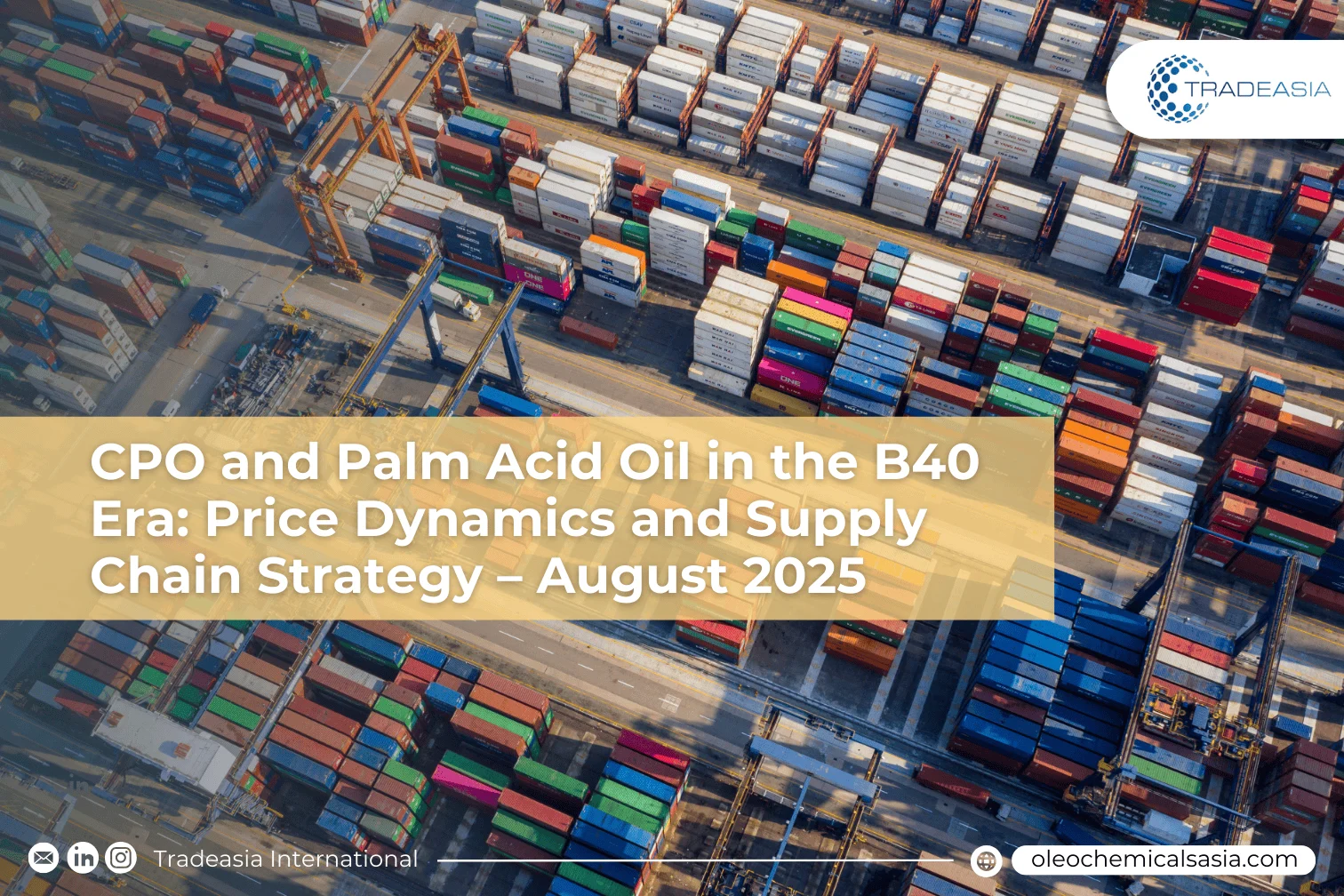Redefining Palm Oil Demand and Trade Dynamics
Indonesia’s mandatory B40 biodiesel policy, which took effect in January 2025, is already reshaping the landscape for Crude Palm Oil (CPO) and Palm Acid Oil. By mandating a 40% palm-based biodiesel blend, the government has intensified domestic consumption, altering the balance between local energy needs, export volumes, and international market pricing. For businesses within the palm oil supply chain, this marks a pivotal moment where domestic priorities increasingly outweigh global demand.
The scale of this shift is significant. The B40 mandate is projected to require 15.62 million kiloliters of CPO for biodiesel production in 2025, diverting large volumes away from export markets. According to industry estimates, including those from Gapki, this could lead to a decline of roughly 2 million tons of CPO exports compared to previous years. In 2024, exports were around 27 million tons and were expected to stabilize near 30 million tons under higher blending mandates. However, with B40’s higher consumption, exportable supply will tighten, forcing the global market to adjust. This redirection alone is equivalent to 1.5–1.7 million tons of additional feedstock, representing about 5.7% to 6.5% of Indonesia’s recent export volumes.
This tightening of global supply exerts upward pressure on international CPO prices, a trend further reinforced by external challenges such as labor shortages, adverse weather, and high fertilizer costs. Production is forecasted to grow by 2.3 million metric tons in the 2024/25 season, which may soften price volatility but will not fully offset surging domestic demand. As a result, palm oil prices are expected to remain elevated in the short term, giving producers higher margins while creating cost challenges for import-dependent regions.
Strategic Shifts for Businesses in a Tighter Global Market
The ripple effects of the B40 mandate extend beyond supply and pricing, reshaping competitiveness in both domestic and international markets. To finance the subsidies supporting the program, Indonesia plans to raise CPO export duties from 7.5% to 10%, a move that creates a price wedge between local biodiesel users and international buyers. For exporters, this erodes competitiveness and could drive regional buyers to seek substitutes such as soybean or sunflower oil, amplifying the urgency for Indonesian businesses to streamline operations and manage supply chain costs.
Palm Acid Oil, a byproduct of refining CPO, is also gaining prominence as producers diversify feedstock sources to optimize costs and reduce exposure to CPO price swings. While volume data remains limited, its increasing integration into biodiesel production highlights the industry’s shift toward resource efficiency and risk mitigation. For trading and refining companies, this presents both an opportunity to reduce costs and a necessity to adapt to a more complex feedstock landscape.
Navigating these shifts requires businesses to strengthen their resilience. Effective inventory management, flexible sourcing, and diversification into alternatives such as used cooking oil can help offset volatility. Moreover, investments in supply chain transparency and market intelligence will be essential in anticipating future policy adjustments and global price movements. For many players, success will depend on agility—balancing domestic commitments with international opportunities while maintaining competitiveness in a tightening global market.
In conclusion, Indonesia’s B40 policy is more than an energy initiative; it is a structural realignment of the palm oil industry. By boosting domestic demand and reducing exports by as much as 2 million tons, the mandate pushes global prices higher while compelling businesses to rethink strategies. For Indonesia, this represents a step toward energy independence and sustainability. For companies, it signals the need for innovation and adaptability to remain competitive in an evolving global marketplace.
Sources:
-
Indonesia delays full implementation of B40 biodiesel; biodiesel output and subsidy impact details
https://www.reccessary.com/en/news/indonesia-delays-b40-biodiesel-implementation
-
Indonesia’s B40 Biodiesel mandate to be implemented gradually, with policy details and market impacts
https://indonesiabusinesspost.com/3376/energy-and-resources/indonesias-b40-biodiesel-mandate-to-be-implemented-gradually
-
Indonesia expects to reach full implementation of B40 biodiesel in March 2025, with export levy plans
https://www.reuters.com/sustainability/climate-energy/indonesia-expects-reach-full-implementation-b40-biodiesel-march-2025-02-14/
-
Preparation and readiness for B40 implementation at Pertamina refinery, biodiesel volume projections
https://www.esdm.go.id/en/media-center/news-archives/jelang-implementasi-b40-di-2025-wamen-esdm-pantau-kesiapan-kilang-pertamina-
-
Indonesia deploys task force to ensure proper B40 biodiesel mandate implementation and compliancehttps://www.palmoilmagazine.com/biodiesel/2025/02/06/indonesia-deploys-task-force-to-ensure-proper-implementation-of-b40-biodiesel-mandate/

Leave a Comment